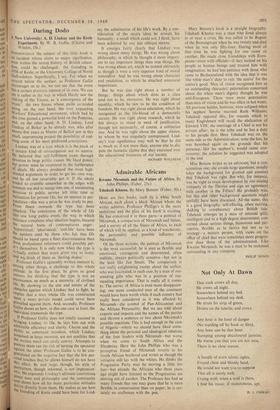Admirable Africans
Kwame Nkrumah and the. Future of Africa. By John Phillips. (Faber, 25s.) Tshekedi Khania. By Mary Benson. (Faber, 30s.)
HERE are two books, each by a white South African, each about a black African whom the writer admires. Professor Phillips's is the more ambitious and the plan of his book is exciting.. He has conceived it in three parts—a portrait of Nkrumah, a comparison of Nkrumah and Smuts, and a survey of all the States of Africa, to each of which will be applied, as a kind of touchstone, the personality and possible influence of Nktumah.
Of the three sections, the portrait of Nkrumah is the most successful; he is seen as flexible and emotional, courageous and determined, often realistic, always politically sensitive—but not in the least like Jan Smuts. The comparison is not really enlightening except about the author, who was fascinated, in each case, by a man of out- standing gifts who was in a position of out- standing importance. That is really all it comes to. The survey of Africa is even more disappoint- ing; one more conducted tour of the continent would have been worth while if each country had really been considered as it was affected by Nkrumah—the symbol of Pan-Africanism and the African Personality. But we are told about exports and imports and the names of the parties and thrown a sentence or two about Nkrumah's possible reactions. This is bad enough in the case of Nigeria—where we should have liked some- thing about the personal and idealogical relations of the four leaders with Nkrumah—but worse when we come to South Africa and the Rhodesias. Here the John Phillips who was a perceptive friend of Nkrumah reverts to his South African boyhood and writes as though the initiative still lay with the whites. He thinks the Progressive Party may be moving a little too fast—but already the Africans who three years ago might have listened to the Progressives are .moving out of earshot. The Professor has had so many friends that one may guess that he is more flexible in conversation than on paper; he is cer- tainly no craftsman with the pen.
Mary Benson's book is a straight biography. Tshekedi Khania. was a man who lived always in or near a crisis. He was called to be Regent of the Bamangwato when he was twenty and died when he was only fifty-four. During most of that time he was fighting for one cause or another. He made close friendships with Euro- peans—even with officials—if they looked on his people as human beings and treated him with imagination; he had less patience with those who came to Bechuanaland with the idea that it was 'the white man's' duty to rule 'the native' for the native's good. Men of vision recognised him as an outstanding character; paternalists concerned about the white man's dignity thought he was anti-European. There were more paternalists than men of vision and he was often in hot water. All previous battles, however, were eclipsed when his nephew Seretse married Ruth Williams; Tshekedi opposed this, for reasons which to many Englishmen will recall the abdication of Edward VIII; the marriage of a Chief is not his private affair; he is the tribe and he has a duty to his people first. Here Tshekedi was on the same side as the Administration; none the less, he was banished again on the grounds that his presence, like his nephew's, would cause con- troversy; the solution he suggested was adopted in the end.
Miss Benson \s' 'rite§ as an advocate, but a con- scientious one; she avoids Idrge questions, usually takes the background for granted and assumes that Tshekedi Was right. But whY, for instance, was heright to resist develoPment by one Mining cinripany'in the Thirties and sign an agreement with another in the Fifties? He probably was, but this and Other background questions might usefully, have been discussed. All the same, this is a geod biography, self-effacing, often moving, shaking to complacency about British rule. Tshekedi emerges as a man of unusual gifts, intelligent and to ,a high degree, determined, con- cerned about serious things, humorous and per- suasive, flexible as to tactics but not as to strategy—a mature person, with views on the office of chief that were sometimes more progreS- sive than those of the administration. Like Kwame Nkrumah, he was a man to be reckoned outstanding in any company.
PHILIP MASON


































 Previous page
Previous page